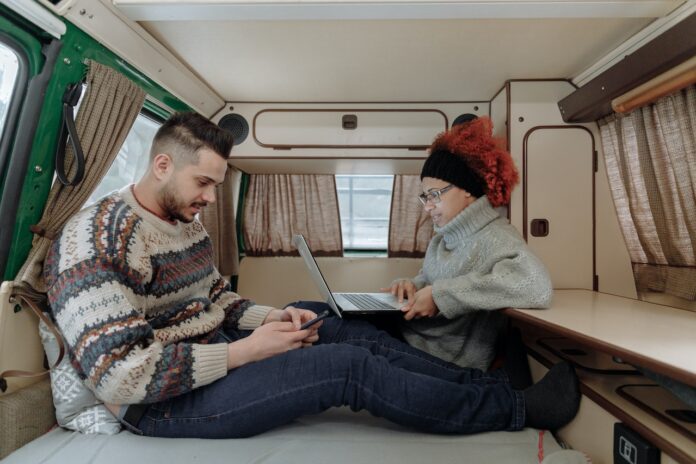A couple has shared comments, detailing how they moved their whole life to work and live in a campervan in a bid to avoid extortionate London rents and house deposits.
Right now, it feels like costs are rising at an alarming rate in the UK. For renters in particular, it can be difficult to keep up with monthly payments, let alone put aside any savings for a house deposit. At times like this, it can be worth thinking outside of the box in order to save money –and one London-based couple has done exactly that.
CashLady.com has partnered with Robert and Mariona Bolohan to share their story of how they live and work from a van, saving an estimated £1,400 per month. Robert commented:
“My wife and I ditched renting in London to live and work from our van, and it’s the best decision we’ve made. Not only has it transformed our lifestyle for the better, allowing us to travel as much as we like, but we have also saved a fortune in the process. We initially made the decision after we struggled to buy a house, despite having a £40k deposit, and so far believe we are saving around £1,400 per month.”
Robert (28) and Mariona Bolohan (26) are the founders of translation agency, lotuly.com, which they work on remotely from their van. Robert has shared his story alongside some tips for those looking for innovative ways to save money who may want to do the same.
Why did you decide to start living and working from a campervan?
“We decided to convert a minibus into a camper to try a new way of living and ultimately to save money.
“The idea was inspired by people on social media trying #VanLife during the pandemic. We thought it could really suit our lifestyle, as we work remotely and love to travel. Plus, we were struggling to buy a house at the time, despite having a £40k deposit, so it seemed like the perfect time to make a change.”
How did you go about converting the minibus on a budget?
“We bought the minibus in April 2022 and took eight months to convert it into a fully electric, self-sufficient and off-grid campervan. We opted for a minibus over a normal van as they tend to be bigger. It has its own challenges but I think we made the right choice.
“We sold our other car and reinvested the money into the van, recovering part of the investment, so to speak.
“There was a lot of work which needed to be done, and we did almost all of it ourselves rather than paying for someone else to do it. We had to ensure the vehicle was in order mechanically, fixing everything and then making sure there was no rust. Then we rust-proofed and soundproofed it and made sure the insulation was sufficient. Then we added plumbing and electricity, built the walls and the furniture, and added the final homely touches.
“One of our top priorities was installing solar panels and batteries so that we never run out of energy.
“We saved money during the process wherever we could. Thorough research was key to making sure we got the best quality items for our money, and we often bought in bulk where we could, to cut costs.”
How much money have you saved due to your new lifestyle?
“We save money each month on rent and energy costs, which already feels significant after just a few months. The fuel costs of the van can vary depending on how much we travel, but right now it’s pretty cheap to run.
“We used to pay around £900 on rent, £150 on council tax, and £200 on energy bills each month; alongside other living expenses, we ended up spending around £1,800 per month. Now we don’t have to worry about any of those expenses. We pay around £400 on fuel each month, so overall this means we spend £1,400 less than we used to, thanks to our new lifestyle.
“Since we moved into the van in December, we’ve saved around £7,000.
“The lifestyle change has also meant that we’ve saved money in other ways, too. For example, we live a much more minimalistic lifestyle due to the size constraints of a van, which tends to mean less spending. We find free spaces to park where we can, and we enjoy shopping at local markets for groceries which is usually cheaper than the supermarket.”
Did you have any reservations about the change in your lifestyle?
“We used to live in a 29sqm studio in London with no balcony, and afterwards we moved in with my parents into a small bedroom in a flat while we built the van, so we’re used to living in small spaces. Even though the minibus may be the smallest of them all, it feels huge because we have the whole world as our garden!
“The move hasn’t impacted anything with our jobs as we have been running our business remotely for the past eight years anyway. Our campervan has Wi-Fi like any other house, and we feel that it’s helped us to run Lotuly even better – being able to go outside and explore after work has helped us to prevent burnout.”
What is your ultimate savings goal?
“Ultimately, the goal is to save up to buy a house in the UK or Spain, but right now we’re focusing on enjoying the van life! We’ve been working non-stop for ten years, and even though we are still working, moving into a van has changed our whole lifestyle in incomprehensible ways and will allow us to visit places where we may want to live one day. When the time is right, we can then sell the van and upgrade to a house.”
Commenting on the tips, personal finance expert Dan Whittaker from CashLady.com said:
“We love Robert and Mariona’s story! Not only have they made a lifestyle change which is preventing burnout and allowing them to work and travel at the same time, but it has allowed them to start saving money to buy their first home in the future.”
CashLady.com has teamed up with Robert and Mariona Bolohan to share their incredible story of the unusual way that they are saving money for a house deposit.
Help keep news FREE for our readers
Supporting your local community newspaper/online news outlet is crucial now more than ever. If you believe in independent journalism, then consider making a valuable contribution by making a one-time or monthly donation. We operate in rural areas where providing unbiased news can be challenging. Read More About Supporting The West Wales Chronicle




















